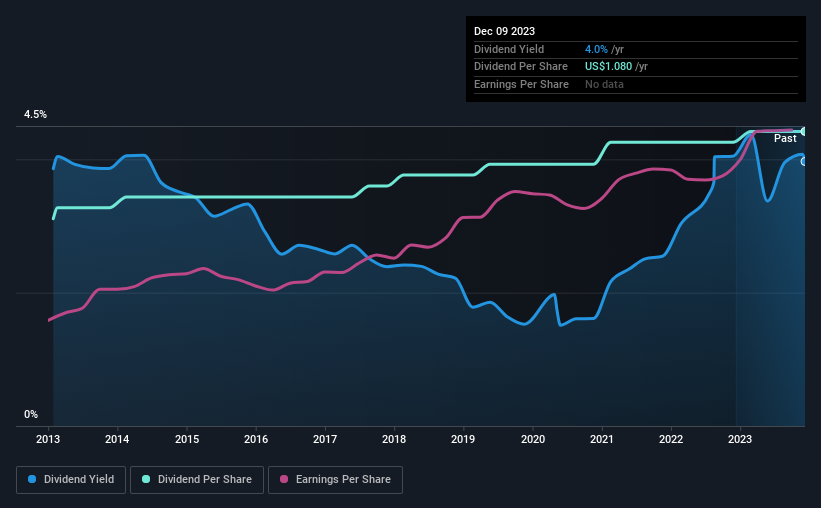Is It Smart To Buy First Capital, Inc. (NASDAQ:FCAP) Before It Goes Ex-Dividend?
Readers hoping to buy First Capital, Inc. (NASDAQ:FCAP) for its dividend will need to make their move shortly, as the stock is about to trade ex-dividend. The ex-dividend date is one business day before a company's record date, which is the date on which the company determines which shareholders are entitled to receive a dividend. The ex-dividend date is important as the process of settlement involves two full business days. So if you miss that date, you would not show up on the company's books on the record date. Meaning, you will need to purchase First Capital's shares before the 14th of December to receive the dividend, which will be paid on the 29th of December.
The company's next dividend payment will be US$0.27 per share. Last year, in total, the company distributed US$1.08 to shareholders. Looking at the last 12 months of distributions, First Capital has a trailing yield of approximately 4.0% on its current stock price of $27.22. We love seeing companies pay a dividend, but it's also important to be sure that laying the golden eggs isn't going to kill our golden goose! We need to see whether the dividend is covered by earnings and if it's growing.
Check out our latest analysis for First Capital
If a company pays out more in dividends than it earned, then the dividend might become unsustainable - hardly an ideal situation. That's why it's good to see First Capital paying out a modest 27% of its earnings.
Companies that pay out less in dividends than they earn in profits generally have more sustainable dividends. The lower the payout ratio, the more wiggle room the business has before it could be forced to cut the dividend.
Click here to see how much of its profit First Capital paid out over the last 12 months.
Have Earnings And Dividends Been Growing?
Stocks in companies that generate sustainable earnings growth often make the best dividend prospects, as it is easier to lift the dividend when earnings are rising. If earnings fall far enough, the company could be forced to cut its dividend. Fortunately for readers, First Capital's earnings per share have been growing at 12% a year for the past five years.
Many investors will assess a company's dividend performance by evaluating how much the dividend payments have changed over time. In the past 10 years, First Capital has increased its dividend at approximately 3.6% a year on average. Earnings per share have been growing much quicker than dividends, potentially because First Capital is keeping back more of its profits to grow the business.
The Bottom Line
Is First Capital worth buying for its dividend? Typically, companies that are growing rapidly and paying out a low fraction of earnings are keeping the profits for reinvestment in the business. This is one of the most attractive investment combinations under this analysis, as it can create substantial value for investors over the long run. First Capital ticks a lot of boxes for us from a dividend perspective, and we think these characteristics should mark the company as deserving of further attention.
On that note, you'll want to research what risks First Capital is facing. Case in point: We've spotted 1 warning sign for First Capital you should be aware of.
A common investing mistake is buying the first interesting stock you see. Here you can find a full list of high-yield dividend stocks.
Have feedback on this article? Concerned about the content? Get in touch with us directly. Alternatively, email editorial-team (at) simplywallst.com.
This article by Simply Wall St is general in nature. We provide commentary based on historical data and analyst forecasts only using an unbiased methodology and our articles are not intended to be financial advice. It does not constitute a recommendation to buy or sell any stock, and does not take account of your objectives, or your financial situation. We aim to bring you long-term focused analysis driven by fundamental data. Note that our analysis may not factor in the latest price-sensitive company announcements or qualitative material. Simply Wall St has no position in any stocks mentioned.

